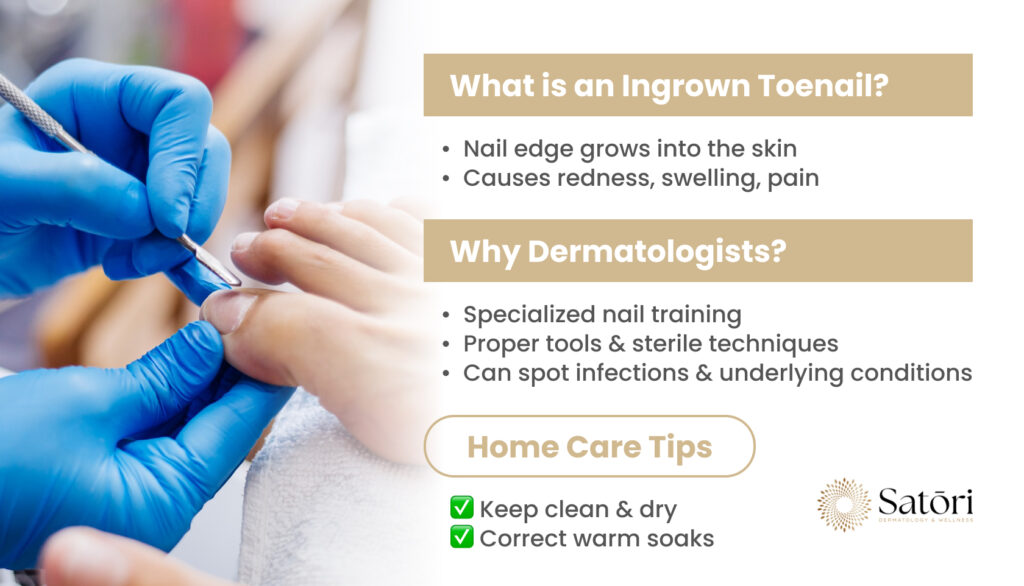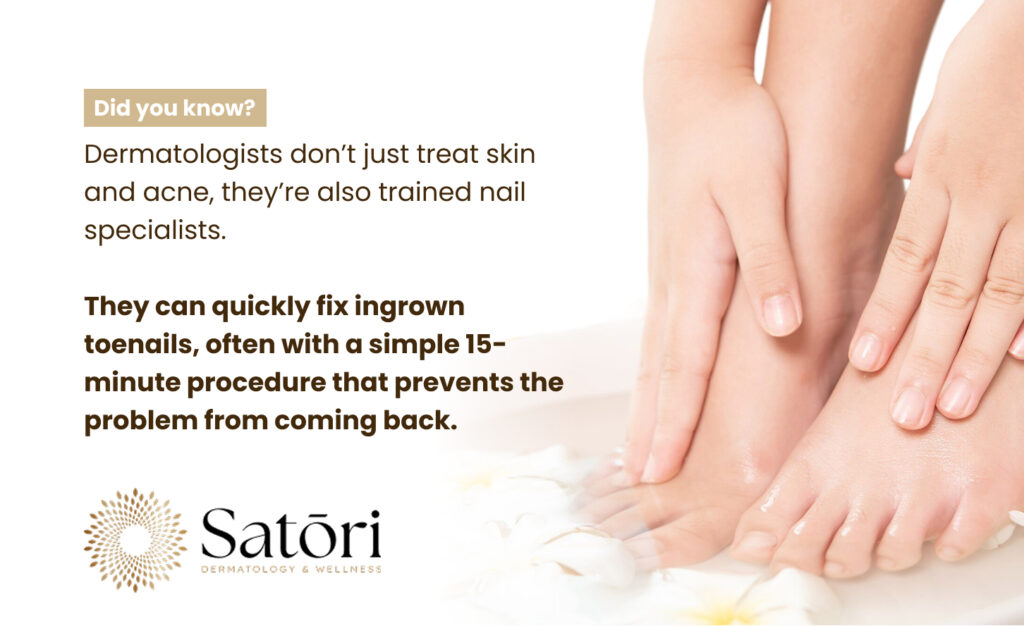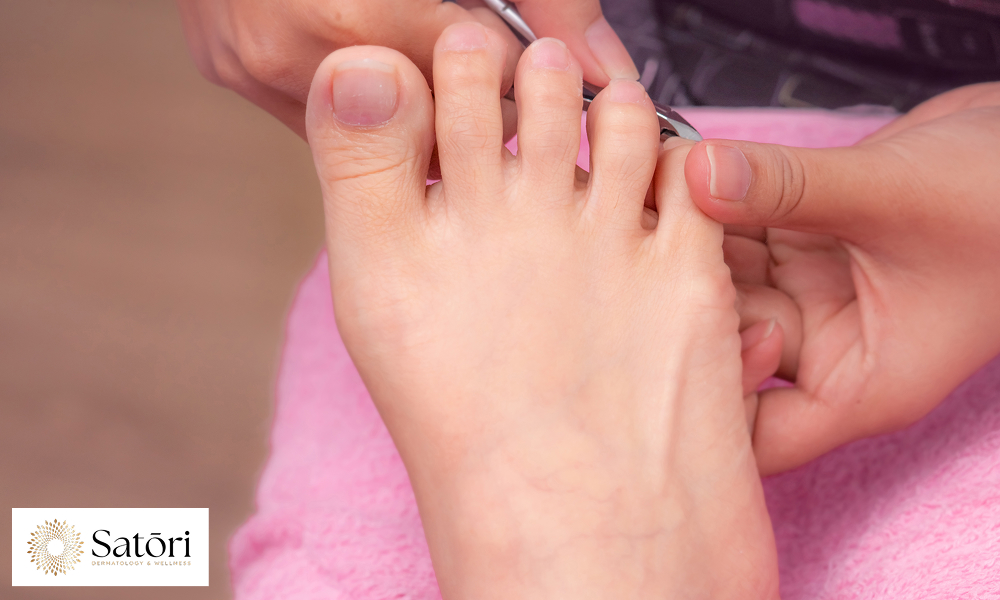Yes, dermatologists treat ingrown toenails. In fact, they’re often better at it than you’d expect.
Most people think dermatologists only handle skin cancer and acne. That’s not accurate. Their training covers everything attached to your skin—including nails. And ingrown toenails? They see them constantly.
Here’s what’s actually happening when you have an ingrown toenail. The edge of the nail grows into the nail bed instead of over it. Your body treats this like an injury. Hence, the redness, swelling, and throbbing pain that makes wearing shoes miserable.
The nail matrix—the area where your nail grows from—keeps producing nail tissue. When that tissue grows in the wrong direction, it creates a wound that won’t heal on its own. Your immune system sends inflammation to the area, but this often makes things worse, not better.
Toenails are particularly prone to this problem. They’re thick, curved, and constantly under pressure from shoes. The big toe gets hit the hardest because it bears the most weight and has the most curved nail shape.

What Makes Dermatologists Good at This
Dermatology residency includes extensive nail training. Residents learn nail anatomy, nail disorders, and surgical techniques specific to nail problems. They’re not winging it.
They also have the right tools. Medical-grade instruments designed for nail procedures. Proper anesthesia techniques for the sensitive nail area. Sterile environments that reduce infection risk.
Most importantly, they can tell the difference between a simple ingrown nail and something more serious. Infections, underlying nail diseases, or complications that need immediate attention—dermatologists spot these quickly.
When do they refer to podiatrists? Usually when there are biomechanical issues with your foot structure or gait that keep causing problems. Otherwise, they handle it themselves.
The diagnostic piece matters more than you might think. What looks like a straightforward ingrown toenail could be a sign of diabetes complications, circulation problems, or immune system issues. Dermatologists are trained to catch these connections.

How They Actually Treat It
Conservative treatment starts with proper cleaning and assessment. Not the gentle suggestions you’ll find online. Medical-grade antiseptics and specific soaking protocols that actually work.
For minor cases, they might recommend warm water soaks with specific additives. The temperature matters. The duration matters. Plain water doesn’t do much—they’ll tell you what to add and why.
Minor surgery is common and surprisingly straightforward. Local anesthesia numbs the area completely. They remove just the part of the nail causing problems. The whole thing takes about 15 minutes.
For chronic cases, there’s a more permanent solution. They can destroy the portion of the nail matrix that keeps producing the problematic nail edge. This prevents regrowth in that specific area while leaving the rest of your nail normal.
Infection management is where their medical training really shows. They know which antibiotics work for foot infections in your specific area. Bacterial resistance patterns vary by location, and they stay current on what’s effective locally.
They also know when infections are getting serious. Red streaking, spreading inflammation, or systemic symptoms mean you need aggressive treatment immediately.

The Home Care Reality
Some home remedies actually work. Others are dangerous.
Proper cleaning helps. Keep the area dry between cleanings—bacteria love warm, moist environments. Change socks daily, especially if your feet sweat.
Warm water soaks can provide relief, but they need to be done correctly. Too hot damages tissue. Too long promotes bacterial growth. Most people get this wrong.
Here’s what doesn’t work: dental floss. This internet favorite is based on a misunderstanding of nail anatomy. The portion of the nail causing problems is embedded too deeply for surface manipulation. Dental floss introduces bacteria and causes additional tissue damage.
Over-the-counter pain medication helps with discomfort, but shouldn’t mask warning signs. If pain increases despite medication, that’s a red flag.
Signs you need professional help: pus, red streaking, fever, rapidly increasing swelling, or pain that’s getting worse instead of better after 48 hours of home care.
Don’t mess around with infected ingrown toenails. Foot infections can become serious quickly, especially if you have diabetes or circulation problems.
When to Cut Your Losses
Home treatment has a short window. Two days, maybe three if you’re seeing improvement. After that, you’re usually just prolonging the problem.
The pain factor is also telling. Ingrown toenails hurt, but the pain shouldn’t be increasing daily. If it is, something’s going wrong with your approach.
Repeat offenders need professional attention. If the same toenail keeps becoming ingrown, there’s usually an underlying cause that needs to be addressed medically.
Stop Limping Around—Get Real Help
Dermatologists can absolutely treat ingrown toenails effectively. Their training, tools, and experience often make them the best choice for these problems.
Don’t suffer through weeks of home remedies that aren’t working. A simple office procedure can solve the problem quickly and prevent it from coming back.
If you’re looking for a dermatologist in Franklin, TN, help is right around the corner. Contact us today!

